- Home
- Rosanne Hawke
Spirit of a Mountain Wolf Page 3
Spirit of a Mountain Wolf Read online
Page 3
“It is a great tragedy here, but I am glad I can help one boy find a future.”
Mrs. Daud smiled at Ikram. It was the happiest Razaq had seen her since the earthquake.
He didn’t even have time to tell Abdul and Hussain to keep an eye out for Mrs. Daud, or to thank Rebekah, Karl, and Mr. Harish for their kindness. He was practically shoved into the jeep and was soon tearing alongside the Indus River. When he looked back at the mountains, he couldn’t even see where his home had been.
When they climbed onto the minibus at Oghi, Ikram spoke to the driver as if he knew him. Razaq didn’t see Ikram buy a ticket, and he didn’t feel like pulling out his father’s purse to offer. None of this was his idea; let Ikram pay for him. His only consoling thought was that his father had wanted him to do this, too, and it calmed him a little.
The bus driver stared at Razaq and winked at Ikram. “Got a good-looker there, yar.”
Ikram laughed while Razaq scowled and wondered what his looks had to do with anything. His mother said he was a handsome boy, and even though he wasn’t as tall as others his age, she said he soon would be. She always told him to look at a man’s deeds not how tall he was, but all mothers said things like that.
They sat at the back of the bus, where one man touched Razaq on the cheek and another let his hand rest on his leg. “Khubsurat baccha, beautiful child.”
“Chup, be quiet,” Ikram said, slapping the man’s hand away. “He’s my nephew.”
The other men laughed. “How many nephews do you have, Ikram sahib?”
An old man told them all to shut their mouths. “Shame on you, it is Ramadan. And have a thought for the suffering of the mountain people.”
One young man muttered, “That is why I am leaving.”
Razaq had never been in a bus, and his eyes kept straying to the colorful transfers on the windscreen. One was of a black horse in full gallop. There was something like a tarveez hanging from the driver’s mirror. Razaq touched his father’s tarveez under his shirt. He hoped it would protect him better than it had his father, and then instantly felt sorry for thinking such a disloyal thing. The engine revved and the bus drew out of the adda, the terminal. Once it was on the Karakoram Highway, it picked up speed. The tarveez on the mirror swayed every time the bus swerved to miss rocks and potholes. Razaq hoped it was strong enough to protect them from accidents. His gaze slid again to the horse on the window. Would it be like this to ride a horse, he wondered. He had never traveled so fast. At times, his stomach felt as though he had left it back at Oghi.
At one point, they had to wait while a bulldozer shifted rocks off the road. Razaq relieved himself by the verge. When he stood up, tying his narda, his shalwar cord, he found the bus driver close behind him.
“Is there any problem?” Razaq asked. The bus driver shrugged his shoulders and gave a sideways glance at Ikram who was smoking nearby. Razaq had the odd feeling Ikram was keeping an eye on him.
It was midnight when they arrived at a bus adda in Rawalpindi. As they stepped off the bus, the driver said something to Ikram that Razaq didn’t catch. Ikram shook his head and said, “Sorry, Saleem.”
Razaq hadn’t felt this tired even after the burial of his father. Dust filled his nose and eyes, and the smell of fumes was stifling. It was warmer than the mountains, but Razaq couldn’t see the stars; there was too much light from the street. Even this late, buses were coming and going, conductors calling out their destinations.
Ikram took him to a small restaurant in the terminal, a little bigger than a booth. Wooden tables and benches stood outside. Inside, there were a few more tables and a TV set switched on for the customers. Razaq couldn’t take his eyes off the people on the screen. A woman was crying, but he knew it wasn’t real, just a play. So this was what Uncle Javaid had described to him.
Ikram ordered chai and dhal for them both. Razaq was hungry; truly he had fasted long today even though travelers didn’t have to. When the dhal came, Ikram called the owner from the kitchen.
“Janab,” Ikram said to him, lifting his chin. “Look who I have here.” He said to Razaq, “Look up, boy. Say salaam to Mr. Kazim.”
Razaq lifted his head from his dhal, and Kazim drew in a breath. His eyes glistened as he pulled his gaze away from Razaq back to Ikram. “Where did you find him?”
“Kala Dhaka, Black Mountain. They were hit but not as badly as Balakot.
They’re still feudal up there, six hundred years behind the rest of us.”
“Incredible.” Kazim’s gaze kept returning to Razaq, who ducked his head in embarrassment to take a mouthful of dhal. “So this is what those tribals look like. Those eyes—so beautiful and innocent.” He glanced quickly at Ikram. “He is untouched?”
Ikram nodded. “He’s the genuine article. His name is Razaq. You interested?”
Razaq saw the look of a bargainer slide across Kazim’s face. “You must realize I have many expenses.”
Ikram grunted. “In this poky hole?” Then he leaned forward. “Ten thousand rupees.”
Kazim put a pained look on his face. Razaq watched in fascination. The previous owner of Peepu had that same expression when Razaq’s father was buying him. “I do not have that much. One thousand rupees.”
Ikram chuckled. “You shame me.”
“Two thousand then.”
“Nine thousand, five hundred.” Ikram’s eyes glinted like steel.
“Two thousand, five hundred.”
Razaq sat straighter. He was so tired it was hard to tell, but was he being sold? How could that be? He was a person, not a ram. You couldn’t sell people. Maybe it was a joke. When friends got together there was much joking, like on the bus. He waited to see.
“Eight thousand,” Ikram’s voice fired like a gun going off.
“Three thousand.”
“Seven thousand, five hundred.”
“Three thousand, five hundred.”
“Six thousand, not a rupee less, Kazim.”
“You will ruin me.”
“But you can afford it, you old rogue. The money now, or I’ll take him to Saleem. He’ll pay more.”
Kazim disappeared into the other room.
“What are you doing?” Razaq asked.
Ikram regarded him a moment, then he said, “This is your job.”
“But why does he have to pay you?”
“It’s my commission for finding you. You will work for him, and soon you can send money home to your mother. Lots of boys from the mountains have jobs like this in the city.”
Razaq looked around the dingy restaurant. He had thought of looking after someone’s animals—he knew how to do that. Cooking—could he cook? He could learn, he supposed. He nodded slowly. He was too tired to look for another job. If he didn’t like this one, he could look for a different one next week. Then he could find his uncle.
Kazim came back and handed Ikram a wad of notes.
“Keeping so much cash here,” Ikram said as he counted it. “Aren’t you afraid of being robbed, old man?”
“You just robbed me,” Kazim said darkly.
Ikram stood up. “But you need him. Didn’t you just lose a boy?” Then he turned to Razaq. “Work hard and you’ll stay alive.”
Razaq watched him leave, wondering why he’d say such a strange thing.
“Chello, get a move on, boy. You may as well start earning your keep,” Kazim said.
He took Razaq into the other room. There was a double gas burner with two large pots heating and two plastic bowls on a wooden table. There was a trough with taps and buckets of water underneath. Razaq had only seen a trough like that at the mosque in the village.
“Boil up some water in the kettle and wash these chai cups,” Kazim said. “My nephew has gone home for the night. You can be the night shift.”
Razaq had never seen a kettle and Kazim had to show him how to switch it on. “Electricity,” Kazim said too loudly. Razaq nodded; he’d heard about electricity.
He could barely keep his eyes
open, but he managed to wash dishes for two hours while Kazim came in and out to make chai and heat up curry for customers.
“Tomorrow night you can do this, too,” he said, “and run for bread from the local naan shop.”
Razaq could hear the noise of the bus station through the thin wooden walls, but as time passed, it seemed to lessen. He wasn’t sure if it was because he was so tired his ears weren’t working properly or if there were fewer buses running.
Finally, Kazim came back in. “You can sleep now. It is three o’clock in the morning. Tomorrow night you will work until five when my nephew Aslam starts.”
He showed Razaq a blanket in the corner. It looked like a dog’s bed, but right then Razaq could have slept on stones. He put his bundle between him and the wooden wall and fell on the blanket. He didn’t even remember landing.
Chapter 4
Javaid Khan was at work in the Fazal Clothing Emporium when the earthquake struck. The shock rumbled all the way down Moti Bazaar, and customers dropped the cloth they were holding and rushed out to Iqbal Road. There was little damage, and after a few hours, the customers returned to start their bargaining all over again. Javaid had not felt the freedom to flee the shop, but he had locked the till for he knew as well as Waqar, his boss, that some would take advantage of an earthquake to pilfer from shops. When the danger was past and the electricity was back on, he listened to the news on the TV Waqar kept in the shop. Both Waqar and Javaid were cricket fanatics, and the TV was usually on for customers to see the progress of a match while they shopped. Many men brought their women to buy cloth, and during cricket telecasts, Waqar’s shop drew the most customers.
Javaid heard how the epicenter of the earthquake had hit the tribal areas in the mountains, in Balakot and Azad Kashmir. Thousands dead, the news reporter said. The town of Balakot was decimated with few survivors. That’s fifty thousand dead alone, Javaid thought. Kohistan and Kala Dhaka were affected but not as badly. At least there were survivors in Kala Dhaka, though no one knew how many: the tribal areas were closed.
“Let them bury their own dead up there,” a customer muttered.
Javaid watched the news in shock. What of Nadeem and his family? He should go and help. Waqar was watching over his shoulder. When Javaid looked up, Waqar inclined his head in sympathy.
“I have to go,” Javaid said.
Waqar hesitated. “What can you do?”
“I can see if my family is alive. Then I’ll come back. Please, give me a week. Someone may have died.”
Waqar shrugged. Always he was losing staff to attend weddings or funerals. Death was a familiar companion and the burial rites had to be observed. “I need you to finish the accounts first,” he said, then walked off before Javaid could argue.
Every day, Javaid watched the news, but there was little said about the tribal areas. The reports were full of Azad Kashmir. In his lunch hour, he googled Kala Dhaka. There were no updates of the earthquake, but he found images that brought tears to his eyes: the twenty-mile mountain range that rose straight up from the Indus; mountain fields he used to roam in as a boy with Nadeem, thick with flowers and fresh air; a tourist’s travel photos of the villages, the ruins of the old British fort on a ridge top. He had explored that as a boy, too. How much of Kala Dhaka was left?
It took him four days to bring the books up to date. Although Waqar was a hard businessman, it wasn’t like him to be so unreasonable, but no one else could use the software on the computer, and who knew how long Javaid would be or whether he would even return? On the next day, Javaid asked again. He feared Waqar would think of some other excuse, but this time he merely sighed. “Jao, go,” he said.
That afternoon, Amina met Javaid at the door of their two-roomed mud house in the Badi Mohalla behind Raja Bazaar. He parked his bicycle in their tiny courtyard.
“Have you heard from home today?” she asked.
“No, but I have a chutti at last to go up there.”
She laid a hand on his arm. “Do not worry, your family would have survived. My Auntie Latifa and her family, too.” She reached up to touch his cheek. “It is far enough from Balakot.”
Javaid gave a heavy sigh. “It’s only thirty miles across the mountains.”
Just then, a little girl flew into his arms. “Abu ji, you are home early. You have a surprise?”
Javaid smiled at her and pulled a bubblegum from his pocket.
“Yum, Hubba Bubba, my favorite.”
Javaid hugged her tightly. Thank God she was safe.
“Abu?” the little girl said.
“Ji, Sakina?”
“Are you happy?” Her little face puckered around her eyes.
“Ji beti, I am happy. I have you to love.” Then he turned to Amina. “I’ll leave tonight, take a bus north.”
Javaid took a rickshaw to a bus terminal on the Grand Trunk Road. It was 8:00 p.m. He bought a ticket and drank a cup of chai at a kacha, or makeshift, restaurant while he waited. He glanced around at the grimy wooden walls, the fly spots on the table, and shrugged. Most people were poor and did the best they could, he knew. So many like himself came from rural areas to make a living in the city, to have a better future for their families. He had been more fortunate than most: his talents in math and computers meant he was truly the one who ran the business of the Fazal Clothing Emporium. He smiled to himself; it was a fancy name for what was really only a shop, but Waqar’s grandfather had named it that after the Partition. Now Amina didn’t have to slave with animals like her mother had, and Sakina could go to school. Education for girls was accepted in the city. Maybe when he had enough money, he could start a school for girls in the mountains. But would anyone use it? He knew his brother’s view on educating girls: “It will only cause trouble. They will think they know more than men and get argumentative.”
Javaid clenched his fingers around the chipped cup. These thoughts made him wish the bus would hurry up and leave. How badly had Kala Dhaka been hit? There was no accurate news.
He heard a boy call a destination: “Oghi, Oghi, Oghi.” Javaid pushed away the cup, picked up his backpack, and boarded the bus. He sat near the front; he knew from experience that the rear of the bus was bumpy enough to put his spine out of line.
Once they reached Abbottabad, the journey to Oghi took twice as long as usual due to a fresh landslide. After a harrowing jeep ride along a potholed bitumen road into the tribal areas, Javaid finally reached Kala Dhaka the next day. He stopped at the village above the river where the mountain people got many of their supplies. It was early morning and bitterly cold. He wrapped his goat’s hair shawl around himself, a gift from his mother before she died. He felt a twinge of guilt: he should have come home more often. Little Tameem’s funeral was the last time, almost a year ago. His mother’s funeral the time before that. Was it only death and marriages that brought him home?
“God willing, let it not be death this time,” he murmured.
He shouldered his backpack and made his way to the mosque and madrasah. He had gone to the madrasah as a boy and not many of his memories were good. It wasn’t where he had learned his math, English, and computing. He’d taken night classes for those in the city.
Javaid was met by a pile of rubble where once the madrasah had stood—rock, cement, and wood all tumbled together like rubbish. A sickening feeling uncurled in his gut. Razaq would be fourteen, too old for the madrasah, wouldn’t he?
He raced across to the mosque. It looked abandoned. He stopped a man carrying food in plastic bags. “Excuse me, where is the maulvi?”
“The maulvi died,” the man said. “A wall fell on him.”
Javaid walked around the village in a daze. Some of the better-built houses still stood, though they were damaged, but there was no life inside. Then there were the piles of rubble that had once been houses. One of these was the home of Amina’s Auntie Latifa.
He couldn’t put off going up the mountain any longer. He had to make sure his family was safe. The long walk up the n
ear vertical path tired him out, as it always did when he visited. He’d become accustomed to the thicker air of the plains. When he was younger, he had run up this path. Every time he glanced down at the Indus it grew smaller, until it looked like a light blue ribbon lying at the foot of the mountain.
When he finally reached Nadeem’s land, a wave of nausea washed over him. The house was gone—there was just a pile of stones and mud with a huge rock perched on top like some prehistoric predator. The house had been dry-stacked stone with mud plaster and a wooden frame; it wouldn’t have taken much to destroy it.
He could smell the carcass of the ram from ten paces, and saw that the birds and wild dogs had been busy. How the children had loved that animal. Razaq had even made a leather bridle for it.
He wandered onto the terraced farmland and found the grave under the trees. He kneeled beside it. Whose was it? It was new and, in Muslim fashion, had no marker. It was an adult grave: Nadeem’s or Zarina’s? He wished he could find out, but nothing would induce him to desecrate a grave. A family member must have dug it, so surely someone in his family was alive.
He sat by the grave for an hour, then said his prayers. He walked across to the pile of rubble that had been the house. Had they run out as soon as they felt the earth trembling? He sat on Nadeem’s charpoy and stared at the scene before him. Something glinted in the sunlight filtering through the trees, something red near the rubble. When he rose to check, he found it was red glass, a tiny broken bangle. That was when the tears finally came. He sank to his knees in the stones and wept like a child.
Chapter 5
Razaq was woken in the morning by a thumping sound. He opened one eye to see a boy a little younger than himself squatting on the ground and grinding spices by banging a wooden pestle into a narrow wooden bowl. His mother used a wooden pestle like that to crush coriander seeds, cumin, and cardamom. She crushed ginger and garlic in it, too. Razaq rolled over and groaned. His back felt like he had been roped between two buffaloes turning a waterwheel in opposite directions.

 Kelsey and the Quest of the Porcelain Doll
Kelsey and the Quest of the Porcelain Doll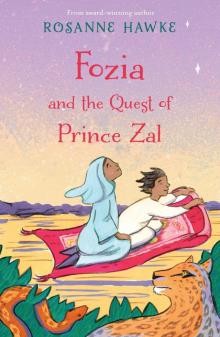 Fozia and the Quest of Prince Zal
Fozia and the Quest of Prince Zal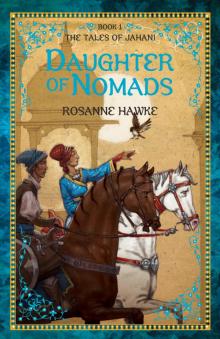 Daughter of Nomads
Daughter of Nomads The Truth About Peacock Blue
The Truth About Peacock Blue Taj and the Great Camel Trek
Taj and the Great Camel Trek The War Within
The War Within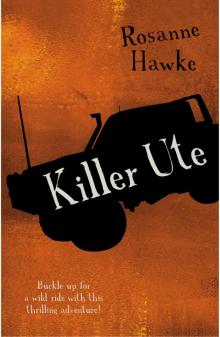 Killer Ute
Killer Ute Shahana
Shahana Kerenza: A New Australian
Kerenza: A New Australian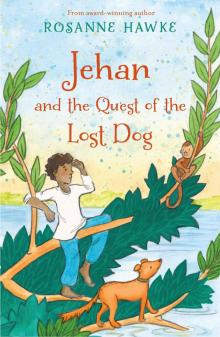 Jehan and the Quest of the Lost Dog
Jehan and the Quest of the Lost Dog Sailmaker
Sailmaker Zenna Dare
Zenna Dare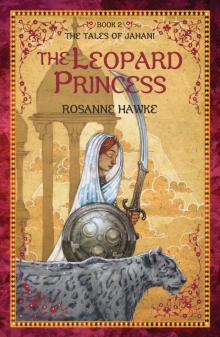 The Leopard Princess
The Leopard Princess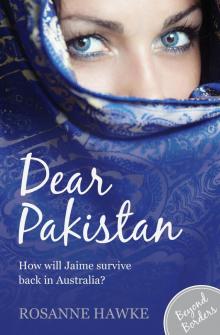 Dear Pakistan
Dear Pakistan Marrying Ameera
Marrying Ameera Finding Kerra
Finding Kerra Spirit of a Mountain Wolf
Spirit of a Mountain Wolf